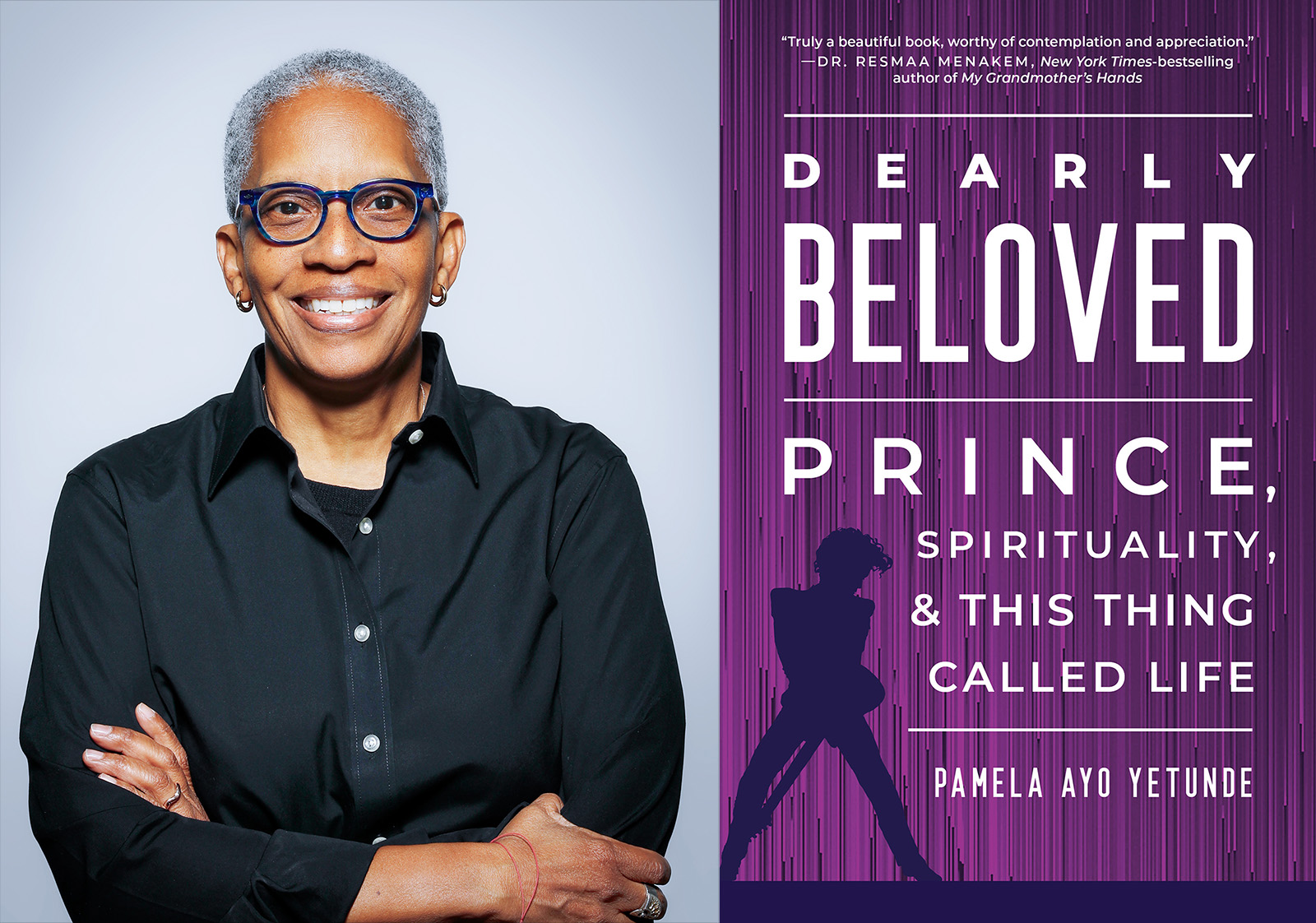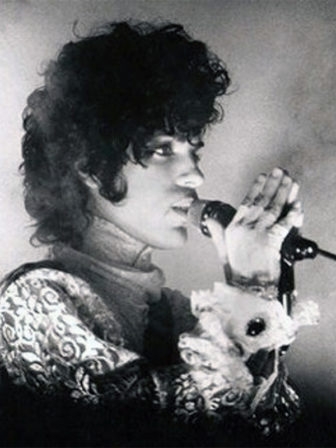
(RNS) — When turning up the 1982 Prince hit “1999,” few partygoers realize the song isn’t just a funky ode to revelry, but an apocalyptic anthem rooted in Prince’s end-times beliefs.
“They say, 2000-00, party over / Oops, out of time / So tonight I’m gonna party like it’s 1999,” Prince croons in the original recording.
To pastoral counselor, Buddhist practitioner and educator Pamela Ayo Yetunde, these lyrics are linked to the late Prince Rogers Nelson’s religious origins in Seventh-day Adventism, a Christian tradition known in part for its beliefs that Christ’s return — and the judgment of humanity — is near. But as Yetunde writes in her new book, “Dearly Beloved: Prince, Spirituality, & This Thing Called Life,” published by Broadleaf Books on April 22, Prince’s spirituality was neither predictable nor static. Whether referencing themes from Seventh-day Adventism, the Kama Sutra or Jehovah’s Witnesses, Prince’s discography reflects a search for meaning and sense of apocalyptic urgency while routinely breaking down binaries between Christianity and sexuality.
Founder of a project exploring the theology of Prince at United Theological Seminary of the Twin Cities in St. Paul, Minnesota — Prince’s home state — Yetunde brings her theological expertise and experience as a longtime Prince fan to bear on this spiritual guide to his work. RNS spoke with Yetunde about Prince’s faith-filled messages and why she thinks the artist should be inducted into the Gospel Music Hall of Fame. This interview has been edited for length and clarity.
Can you take us back to the first time you remember having a spiritual encounter with Prince’s music?
I’ve been listening to Prince since I was 17. I’m 63 now. And when I heard his song “I Would Die 4 U,” I knew instantly that he was talking about and singing about the teachings of Jesus that I had learned about in the United Methodist Church. I had never heard a rendition of Jesus’ teachings with that kind of rhythm and danceability.
You call your book “Dearly Beloved” and use that phrase throughout it. Can you talk about the role this phrase played in Prince’s music?
My interpretation of Prince’s relationship with his audience was one of understanding that we were all very vulnerable people — vulnerable to loneliness, vulnerable to being misunderstood, to being judged, to being ostracized and to being exploited. It’s my understanding, through Prince’s music, that his belief was that God saw all of God’s children as beloved, and that if everyone could believe that, then they could believe in the goodness of God’s creation, and also the potential for everlasting life in paradise. And so, to be addressed as “darling,” “dearly beloved,” repeatedly, over and over not only endeared his fans to him, but I think through him, to God.
How do you see Prince’s Seventh-day Adventist roots influencing his theology and music?

Prince performs at First Avenue nightclub in downtown Minneapolis in 1983. (Photo by Joel Bremer/Wikimedia/Creative Commons)
I’m not Seventh-day Adventist. I grew up in the United Methodist Church, and these are both Protestant traditions. In both traditions, there’s a split between good and evil, heaven and hell, God and Satan. Prince pitted these binaries against each other, especially as it came to our sacred belovedness and also our carnal desires for sex, lovemaking and so on. He would pit these dialectics against each other not just in his lyrics, but even in his own personifications. This dialecticism is a way of producing what is really true. What is really true about sex? Is it really as evil as these Protestant traditions say it is? Is it only good if it’s for procreation within the context of marriage? Let’s test it out. His encounter with the Kama Sutra taught him that sex is good if your intention is to be pleasing, and if you are artful about it, then it leads you to a religious experience. How do you put all of that together? How do you pit the Kama Sutra against the Gospels of Jesus, and some of the old-time religion, to produce the truth?
Can you give an example of a Prince song that has an often-overlooked spiritual meaning?
Of the many songs I could choose from, I’m going to choose “Lady Cab Driver” because it’s so nasty. I think because of the overt, explicit sexual expression that comes out in the lyrics, it clouds the sacred journey that Prince was on and was trying to take his listeners on by being in the cab. The cab was the vehicle to protect him from satanic forces, but the satanic forces were still within the celestial cab. So what he does in the cab is he has sex with the angel, as expressed in these pelvic thrusts, but his desire is for salvation. And a lot of people hear the song as something to dance to, something to be imaginative to as it regards sex, but not the explicit spirituality that’s in the song.
How did the spiritual messages in Prince’s songs evolve?
I think about Prince in three stages: his teens and early 20s, his 30s through maybe 50, and then after 50. Those are not clear lines. In his early years, he was portraying himself as a young buck, someone who could have sex all day long, incorporating Kama Sutra poses. He was also engaged in his writing with a lot of objectification, both of himself as a sex machine, and of women as a “Tambourine,” a “Little Red Corvette,” “Raspberry Beret.”
Then, later, he ventures into one of my favorite songs, “The Ballad of Dorothy Parker.” Now we have a woman who has a name, a career, a personality, and she is beguiling. We see the development of a more mature Prince who can write about women who have agency. And then, as he grows into his own life, he marries. They have a child. The child does not survive. He experiences grief, divorce. He marries again, another divorce, and just gets older — like we all do — and I imagine things are getting harder as the body gets older. And he’s looking for meaning throughout his whole career, but at a certain point, he decides he wants a mentor to help him really understand the Bible. Larry Graham becomes his mentor in the Jehovah’s Witness tradition, and as I understand it, they believe everything that’s written in the Bible is the truth. It’s inerrant. Consequently, we see less of Prince the dreamer, interpreter and spiritual innovator. He becomes more literal and more legalistic, less interpretive. And we see this, for instance, in his 2001 album, “The Rainbow Children.”
Why do you think Prince should be inducted into the Gospel Music Hall of Fame?
Prince did not want to be categorized. As soon as our wider culture put him in a box, then he would come out with something different. He was quoted in an interview that he could not express himself explicitly regarding religious views back in the day. So, he embedded his implicit religious messages in his music, oftentimes through sex and sexuality. So rather than keep his music, his mission, hidden in a way that he couldn’t express early in his career, why not honor that now?
And because there are so many songs and albums about his religious beliefs, his Christian beliefs, I would say he has recorded probably more songs and albums about religion than most of the gospel artists we are aware of. Since he wanted to be understood as multigenre, and I think he earned that, why not ask the Gospel Music Hall of Fame to consider Prince as a member? It seems like it’s worthy of consideration, even though I’m sure they will struggle with the fact that he sang and wrote about everything from incest to orgies.
He was a complicated artist. He’s left a complicated legacy, but I don’t think we should dismiss his ultimate message, which really was about ultimacy: getting ready for the second coming, and how to live in times of destruction that many people are experiencing now.
